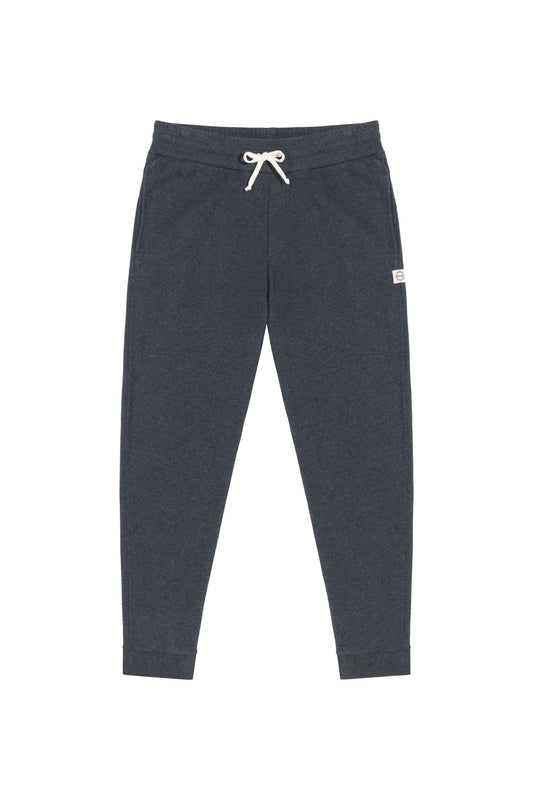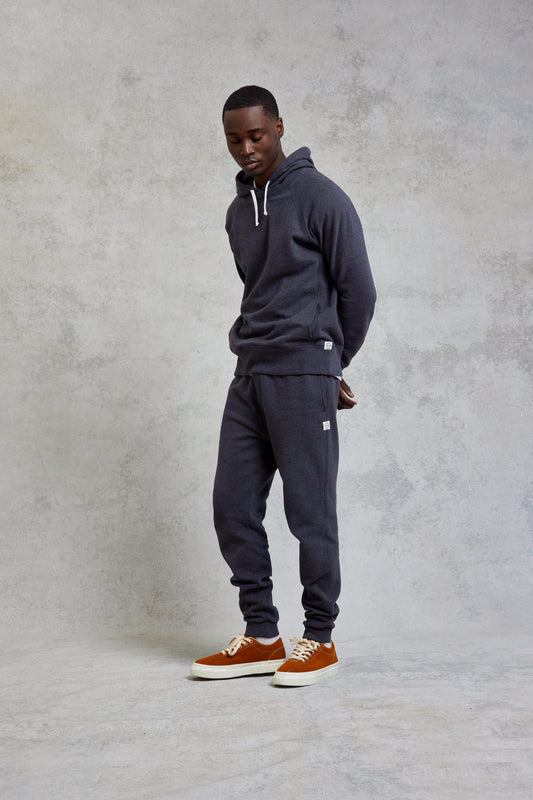The Wellwear Interview - Jason Fox
Jason Fox is a former special forces soldier who spent two decades in the Military. After joining the Royal Marines Commandos at age 16, he went on to serve in the Special Boat Service (SBS), arguably the most elite special forces unit in the world. In 2012, he was medically discharged with PTSD. Jason went on to become a TV presenter and an inspirational public speaker, discussing his battle with mental health after returning to civilian life. He supports several charities, has written books, and is perhaps best known for his appearances on Channel 4’s SAS: Who Dares Wins.

What does well-being mean to you?
For me, well-being is about an all-encompassing approach to looking after yourself. It’s about everything in moderation except for your approach to sleep, food, drink, mental health and physical health. I think people frown at being sat on the sofa, but there's a lot to be said for having that time to yourself, checking you're in the right place mentally. And if you're not, thinking what you’re going to do about it. So, for me, well-being is everything: from being comfortable in what you wear, to what you eat and drink, to how you sleep. It's all that.
What do you think are the most essential things for looking after your mental health?
You have to go a bit deeper. Everyone knows about physical health. You go to the gym, go on a run or get on a bike. Whereas mental health is that, but more. What you put into your body and how much sleep you have both have massive impacts on the way your mind works. If you're tired, you're probably going to be less prepared to deal with unexpected events that happen in life. But even if you do allow yourself all the good stuff (sleep, food, drink), you've also got to be prepared to sit down and be honest with yourself if you're not feeling right. I think the key to the mental health side of things is not being scared to sit down and explore your own feelings. If you're feeling negative, whatever that looks like, instead of trying to ignore it, you should probably sit down and ask, ‘Why do I feel like this?’ Explore it a little bit. In doing so, you might work out what you have to do to fix it. It might not happen, but at least you're already starting that journey.
You’ve been in some very stressful and dangerous situations in your life, how do you destress and relax?
I live in London. It’s stressful and dangerous every day! In the past I haven't dealt very well with the stresses that come with my old career. But I have learnt that decompressing after a stressful event or few days is really important. There are a lot of different ways I do that. One of them would be to make sure that I get out into the country – especially living in London – for a few days in the wilderness. As much as I love living in London because of convenience, there's a definite link with the outdoors that I need. If I can't do that, then I'll make sure that by a certain time of day I will switch off and allow myself some time to clear my mind, and be a bit thick: just sit there and watch mind-numbing TV while not concentrating on the stresses of life. It's taken a while to learn how to do it. Because of being involved in stuff before, every time something gets stressful I need to force myself into relaxing. Now when something is stressful, I’ll get to the point where I’ll tell myself, 'Right you need to now stop thinking about that.' I've managed to do it somehow. With a bit of perseverance, I am able to start switching off.
When you came back from military operations, you suffered from PTSD. What did you do to combat this?
It took a while for me to recognise it. Even when I half-acknowledged something was going on, I wasn't being honest with myself. Me leaving the military had to happen. Then me contemplating suicide had to happen. I knew I had to do something as drastic as that or start being honest with myself and making some changes. I was dabbling in being honest, acknowledging I had some problems I needed to address. But I wasn't being honest about how serious they were or how much hard work needed to go into fixing them. I finally realised this was going to be a bit of a slog, but it was the honesty, that pivotal moment, that really helped. After that it was a journey of talking to people and sitting down with my head, going, 'Those events happened and are in the past but what am I going to do going forward and how am I going to learn from them?'
Are there any common misconceptions among civilians about well-being or its lack thereof in the Armed Forces?
I think the military have got a bad reputation when it comes to well-being because of the media. I'd suggest they should probably turn their attention to the corporate world if they're looking for a really bad example. I'll be the first to criticise the military in Britain, but they are good at being ahead of the game. They're always looking at how they can invest in their people and how they can best manage and look after them. I think the biggest misconception about the military is that they don't care about their soldiers, sailors and air people. They do. It's a huge organisation and they don't always get it right. But that's not because they don't care. It's almost impossible to cover all bases when you're employing half a million people. It's tough work, but they do try and they're all about investing in their people and getting human performance up to a really high level. I think people should look at the military to see how they can learn from it.
You’ve taken on a number of extreme expeditions to places like Alaska and the Yukon River. What is it about challenging yourself that appeals to you?
I love the apprehension that comes with taking on a challenge. The first major challenge after leaving the military was rowing the Atlantic. I was like, 'What am I doing? I could die.' After the event, I looked back and realised I love that feeling of apprehension, the preparation of the logistics and getting kit ready. So, now I spend more time in the now and enjoy the nerves. With expeditions, I love the build-up, though getting out there is amazing. The Yukon was next-level being in the wilderness. I was chatting with my friend Sean about a film called Wind River. When I’d watched it I thought, 'Wow. They're in the wilderness. That must be scary.' Then I thought, 'Hang on a minute. We're in it now!' To think we were in parts of the world where there isn't anyone for hundreds, maybe thousands, of miles – it was really cool.
Presumably there were no bear chases in that movie, unlike what you experienced in the Yukon?
No there weren't any bears featured in the movie. Just really nasty humans, which can be just as frightening. But at least with a human there's an opportunity to maybe reason with it. But with the bear, there was no reasoning with that. We had to leg it!
What clothes do you feel best in?
If you haven’t, you’re going to have to try on some of Gandy’s Wellwear. I have a couple of pieces and I’ve got to say, they are next-level comfortable.
If you could choose one item from the current David Gandy Wellwear collection as a present to yourself, what would it be?
To be general, the loungewear. I’ve got the Luxury Lounge Set. It’s unbelievable. And the Restore Jogger. It says it’s a jogger but I don't go running in it. I just sit around in it.
What sort of music do you listen to raise your mood? I’ve heard you’re quite fond of a little Kylie Minogue!
Ha! Let’s get one thing straight here. I do enjoy Kylie Minogue. Once I was out on a special forces mission and all the lads were sat at the back of the helicopter. Some of us had the old iPod Shuffle. There was a particular moment when it all went a bit crazy and the song on my playlist was Kylie Minogue’s I Should Be So Lucky. That’s why I’ve mentioned her before. But my music is diverse. I listen to all sorts, from heavy metal and dance to classical. I'm going through a phase at the moment of really enjoying Paolo Nutini’s new album. I like a bit of singer-songwriter stuff.
Do you have an exercise or exercise routine that you rely on to keep you physically and mentally primed?
It's faltered a little recently because I broke my leg, but the burpee. You don't need a lot of space. If you've got enough space to do a burpee you’re all good. Everyone hates them, but that’s why I love them.
On the same subject, many people with sedentary jobs have limited time for exercise. Is there any single sport or activity you’d recommend for keeping fit and healthy?
I’ll always default back to the burpee, but the thing with exercise and being in an extremely busy job: everyone's always looking for the quick fix. The only way through it is discipline. You don't have to dedicate too much time to exercise to make yourself feel good. I'll get up in the morning and do a routine of moving: whether that's a bit of stretching, a bit of mobility, and then mix that in with some press-ups, squat jumps and maybe the burpee. By doing that in the morning, you've nailed it already. You can do 10 minutes and it's not a major workout but you're already feeling better about yourself. If you can spare 10 minutes three times a day, you've done a half hour of movement. You'll get to the end of the day and that's pretty good. You've got to get your head around it, tell yourself you are going to do it, knowing that you'll feel so much better.
Did you spend much of your career as a soldier in a uniform? What is your go-to uniform today?
Actually, in the special forces you don't wear a uniform. You just wear jeans and a T-shirt. But today it's got to be the Wellwear Luxury Lounge Set. I wear it so much that people are looking at me like, ‘You haven’t even had time to wash it!’
Former soldiers sometimes talk about dark humour helping them in difficult situations. Do you think humour is important for how you feel?
I think it's very important. I'm a big believer in not taking myself too seriously. I think taking yourself too seriously can be detrimental. When things go a bit wrong, as they invariably do, if you take yourself seriously, you can sometimes really struggle with difficult moments. Whereas if you always have a smile on your face and are willing to take the piss out of yourself, no matter how dark is, I think it sets you up for a better outcome. I was taught as a young Marine that one of the four pillars you should live by is cheerfulness in the face of adversity. I think what that actually means is you've got to find the silver lining to any dark cloud, to be cheerful in dark situations. Because if you're not, you're not getting out of it. Even if you spin it in a very darkly humorous way, you’re trying to find the fun in a very epic situation. And that gets you in the right mindset for digging yourself out.
When was the last time you properly laughed, and at what?
Interesting. I laugh regularly. You know what? I'm in a group so I'm not going to quote what it was at. But I’m in a group with the lads I rowed the ocean with. It’s usually taking the piss out of myself. So, the last time I laughed was probably earlier today. It was at myself and it was on a WhatsApp group.
Camaraderie is known to help soldiers get through tough times. How important do you think having a support network is?
Probably one of the most important things. Everyone thinks they're on their own. Ultimately, there are eight billion people on the planet, and there are eight billion people on the planet for a reason. It's because we love social groups and networks. So, you need to build or find a team around you that can help support you through difficult times. It doesn't matter how big it is. You've got to find those people. And if at first you can't find them, don't be despondent. Keep going and looking for the people you connect with.
What is the scariest thing you've ever done?
I’m sure people will think it must have been something crazy. I've been involved in some pretty hairy stuff within the special forces, like missions, gunfights, and that bear encounter was scary. Rowing an ocean was scary, too. But I think the scariest one was dealing with my mental health because I was not taught to deal with that. I taught myself how to row an ocean. We knew what we were going to do with the bear situation because we’d already run through that scenario in our heads. You’re taught over and over again how to deal with gunfights. But no one had ever taught me how to deal with mental health. I think that’s why I found it the scariest.
Do you have any tips on getting a good night's sleep?
There are a few different things, but if you're really struggling, do that exercise you couldn't fit in earlier on in the day. Just bang out a 10 or 20 minute routine and you'll be asleep. But that's an extreme. For me, it's having a good bit of decompression before bedtime. So finish your work, laptops shut, phones off, and then it's all about a freezing cold shower and a cup of herbal tea. If I’d told myself that 10 years ago, I would’ve punched myself in the face, but it does work. I use CBD oil as well. A couple of squirts under the tongue. I don't know whether it's a placebo or not, but it works for me.
You’ve inspired and motivated many people. Who or what inspires you? Who is your hero?
Lifelong it’s my dad, who’s always taught me to pursue excellence. He's always good at what he does and puts his mind to things. He inspired me to join the Marines and to push on when times were – and are – difficult. You have a lot of people that are influential and inspirational throughout your life so it’s difficult to pinpoint them all. I've got a mate that I work with called Billy Billingham. He's a bit older than me so if I’ve got a problem, I’ll normally phone him up and share it with him. He’s normally got advice on it because he’s gone through the same situation himself at some point. So, Billy Billingham is a really good guy as well, a good inspiration, I’d say.
What’s next for you?
There are a few more TV shows coming out we filmed earlier this year. The new series of Special Forces: The Ultimate Test premieres on 4 January in the US and, in the same month, the new series of SAS: Who Dares Wins returns in the UK. Sean – the guy I did the Yukon with – and I are looking at doing another river soon. We know what that is but it’s yet to be confirmed because we need to make sure the logistics are squared away. But it will be in a far-flung, wild place.




